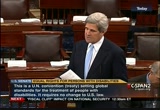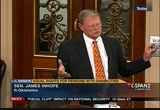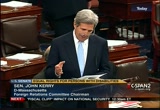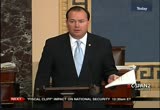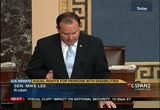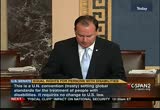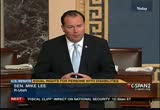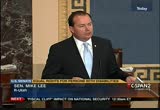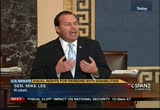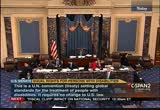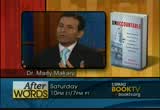tv Capital News Today CSPAN December 4, 2012 11:00pm-2:00am EST
11:00 pm
11:01 pm
there would be a change in mr. dsm point, that that might affect america. as the senate are not aware that any change to the treaty in order to go into effect and has any impact on the united states would require the nascent consent? without the advice and consent of the senate, no change could possibly impact united states. >> outhouses the bureaucrats running the program would have clarification word is otherwise vague. the point i am making here is we don't really need to do that when we have her hearing. i understand there's a difference of opinion on this and a lot of motion. i found this morning's roll call magazine, all the people find appeared with the distinguished senator from massachusetts. it doesn't say anything in the
11:02 pm
articles that certainly attacks the emotions of individuals. so yes, i am not satisfied they would not interfere and do their clarification to change the intent. >> we've taken care of our problem here. >> the mr. president, it's important in this kind of debate as to make a judgment as senators that we base our judgment on facts than on the reality. the senator has suggested he's opposed because he can oppose outside of america. he can't do that because it would require the advice of the senate. secondly, it's a senator aware that senator ridge asked the justice department whether or not the corporate effect of a non-self-executing declaration in this treaty.
11:03 pm
the responses the united states ratified the international covenant of civil and political rights on express understanding that he was not self-executing. so it did not create applications enforceable in the federal court. the supreme court in the united states has told at the very standard applied in this treaty that is not self-executing means nobody has access to any quarter. there is no enforceable right to get anybody in america create in this treaty. the mac to enter the senator, i'm not aware of the specific british request and what response they drew. i would only say this. it's important, mr. president to understand whether distemper senator from massachusetts and i differ on most of these treaties, with the same disagreement on the law of the sea treaty. the question is in my opinion is their sovereignty of believe
11:04 pm
infringed upon our sovereignty and with that i yield the floor. >> mr. president, i yield five minutes. to the senator from illinois. >> by methinks senator kerry, senator mccain, senator lugar and so many others who have put this matter to the floor. it was 22 years ago when a historic event took place on the fourth united states senate which changed the united states of america. 20 years ago we passed the americans with disabilities act and reset a disability should not disqualify you for them at you in terms of their opportunity as an american. for some people said this is obvious. everyone knows. it was also obvious was discrimination taking place all across this great land. we remove that barrier to discrimination and in passing the americans with disabilities act can we step forward at the
11:05 pm
nation. with their fear and concern? i can recall going to greene county in rural illinois and marketing to carrollton and the city hall and they said, does this mean we have to build a new restroom for the disabled quakes the answer was yes and curb cuts and other changes that seem so superficial to many, but bitterly whether or not a disabled person can be part of america. what we did 22 years ago was really novel because if you look at the course of american history, i think we have distinguished ourselves in successive generations by expanding the reach of freedom and opportunity. think how many times who do not. if you go back to the earliest days of this great nation with older white men sat together and decided who would rule america, they were thinking about those of color. they were thinking about women. they were thinking about the
11:06 pm
disabled and they sure weren't thinking about those who work property owners. it was an elite group that would form our quote democracy. then suggested generations of americans decided if democracy went anything, if america meant anything we needed to expand the reach of opportunity each generation. the bloodiest experience was in the civil war with accented thousand americans were killed in the course of a war that went on for years and could have divided us once and for all is a nation that didn't. the leadership of abraham lincoln and inspiration of so many others in the blood, sweat and tears him i said that it is, we see this republic. we ended slavery. we created an opportunity which still took us years and years to become a reality, reality we are still working for today. so now comes the treaty of the floor. the treaty says what we did 22
11:07 pm
years goes the nation is something we are proud to stand behind. it is basically an idea we have created an america that we want to export to the world. as we reflect on this debate and you've heard some of those who opposed it, it's interesting the approach they are taking. they are fearful of change. they are fearful about the expansion of opportunity for the disabled might mean to america. senator kerry has made the point very clearly. this convention, this treaty will not require the united states to change any law. if any changes are made in the future, they will be made with the workings of congress and the president. this convention will not force this change. we meet all of the standards established in this convention when it comes to disabilities and president george herbert walker bush a republican when he negotiated and crafted the treaty said as much. of course there is those who
11:08 pm
still question. every time we open a door of opportunity, every time we've expanded the definition of democracy to include another group at least partially if not fully excluded. there've always been been voices of concern and worry. there have been those who set were not ready for that much change or they would say i'm not opposed to people of color, but if you force every hotel and restaurant across america in interstate commerce to open their doors, that may be going too far. after listening patiently we have ignored them and move forward with the new definition of freedom in this country a new definition of opportunity and that's what this does is become to get from the floor of the senate here. as we gather to discuss the historic treaty and what it means in our future, there's a reception taken place across the
11:09 pm
street. they are honoring one of our own, a man who served this country in an exceptional way. his famous bob dole and in russell, kansas who served in world war ii, was severely disabled, came home uncertain of their future but dedicated his life to public service. i don't know how many weeks to months or years i looked in bob dole's life, but he think the passage of this convention i on disabilities to place's work at the moment. we owe it to bob dole, two of the disabled him who stand with locked arms taking us to pass this convention. we ought to disabled people across america and around the world to stand up once again for the race of the disabled and for expanding opportunity. not just in america, but across the world. people say we are an exceptional
11:10 pm
nation. there's a little bit of egotism in that statement, but i believe it is. i ask for additional 30 seconds. i believe it is factual and america is an exceptional nation that said sorting the believe that freedom and liberty and opportunity should be for everyone within our country and around the world. today is our chance. let no minor argument over some minor political issues from focusing on the reality that what we are doing this historic. not just for america, but for the world. we always not just to bob dole. we over to the disabled veterans and disabled community to stand up and say to the world, join us. join us in expanding the reach of opportunity to those left behind. i yield the floor. >> reserve the balance of our time. >> the senator from utah.
11:11 pm
>> mr. president, i rise in opposition to the ratification of the u.n. convention on the rights of persons with disabilities. this i understand it's a sensitive topic, one about which many of my constituents on both sides of the issue have strong feelings. certainly most of us that not all of us have a family member or friend with a disability and all of us live in a society that includes the disabled is highly valued members of our communities. i've heard from advocacy groups listing of people who hope and believe that this treaty will protect disabled americans as they travel abroad in mexico about go about their lives. but i've also heard from parents of disabled children who are concerned that this treaty and adherence to the best interests of the child standard and article vii will threaten their rights as parents to determine the best education treatment and care for their disabled children. proponents of the treaty will dismiss those concerns as myth. i simply cannot support a treaty
11:12 pm
that threatens the right of parents to raise their children with the constantly made for a state interference. if this vote in this treaty were in fact about protecting the rights of americans with disabilities, i might have a different position in the debate would take on a very different tone. this treaty is ultimately not about protecting rights of americans with disabilities because this treaty simply has no enforcement mechanism to protect those rights, the rights of disabled americans including veterans who may travel the country such as china or russia or mali or any other country that may choose to adopt this treaty. if the senate desires to protect rights of disabled americans who travel abroad, the senate would do better to encourage other nations to model their own reforms, their own internal legal structures after the americans with disabilities act, which 20 years after its passage
11:13 pm
still send a message that disabled americans will always have fair access to housing, employment and education in this nation. i've mentioned a few things to treaty does not do. i like to few things to treaty does do that cause me some concern. article xxxiv establishes a committee with the rights of persons with disabilities. this committee will establish its own rules of procedure and parties to the treaty are required to submit reports every four years. in general, u.n. human rights treaty committees have made demands the state parties that fall well outside of the legal, social, economic and cultural traditions and norms of state parties. sometimes recommendations also fall far afield from the stated topics of concern within the individual treaties.
11:14 pm
for example, the u.n. convention on the elimination of discrimination against women included a recommendation that china had decriminalized prostitution. the u.n. committee on the elimination of racial discrimination went to great lengths to score the united states and its detention policy at guantánamo bay. these recommendations often fall well beyond what even in direct conflict with the treaty's school spirit article vii of this treaty provides best interest of the child standard misstating an election concert in children with disabilities come in the best interest of the child shall be a primary consideration. we all want to support the best interest of the child, every child. but i and my constituents including those who home school their children or send their children to private or religious schools have justifiable doubts that a foreign u.n. body, a
11:15 pm
committee operating under geneva, switzerland should decide what is in the best interest of the child at home with his or her parents in utah or any other state in our great union. article for this treaty obligates the united states to recognize economic, social and cultural entitlements is rights under domestic u.s. law. the senate is my opinion has not adequately investigated how the standard will affect domestic u.s. federal and state law. we have had one hearing on this issue that included both opponents and opponents of the treaty but did not substantively address my concerns about the standard, about the significant addition to what would become the law of the land of the united states of america. for these and other reasons, mr. president, he must oppose the u.n. convention on the rights of disabilities and encourage my colleagues to do the same.
11:16 pm
thank you mr. president. >> senator from massachusetts. >> i listen carefully to the senator and i understand colleagues on the other side of the aisle have concerns about the united nations and i respect that. we've had the space before, but i'm having difficulty finding where the threat gains any reality the senator has described specifically with respect to children the senator mentioned the question of the committee being created and sometimes committee make recommendations outside the purview of something. while that may be true, but when have words -- i guess the senator, when have words or suggestions that have no power, they cannot be implemented, but have no access to the courts, that have no effect on the web the united states and cannot change the lot of the united
11:17 pm
states, when has that ever threatened anybody in our country? >> one of the united states ratifies -- >> does the senator agreed there's no power to change our love? >> no, i don't agree. >> and the senator show where it is specifically when the supreme court has held this is not self-executing. there's no access to american courts when it is clear by the statements of the treaty itself there's no law of the united states is changed when attorney general hornburg who hope to negotiate this on behalf of president george bush says there is no change and not, what is it the senator suddenly has the choice has any basis in fact? >> whenever we ratify a treaty becomes the law of the land under article vi of the u.s. constitution. secondly, what with the body of the it becomes part of the
11:18 pm
customary law that does make its way into u.s. judicial opinions. as a direct? no. does it directly undo any statue? no appeared but that doesn't mean it has no effect. if it had no effect we wouldn't be debating it today. it's the type of effect we worry about. do when i see things differently as to what effect it might have. that is not to say it has no effect. we shouldn't be ratify any treaty that we think might offset you a slot you a slot as it now and we believe this could have that impact. exactly where that's going to, but can't prove where that's going to happen. but it does have some impact when we ratify a treaty we make it the law of the land. >> mr. president, i would ask the senator further. i know he's a good student of law, practitioner of law. i believe he understands that the treaty does not become customary international law just
11:19 pm
because the u.s. or their country better face it. senator is aware that i assume. >> it doesn't become the law of the land because it's in a treaty, but it often does anything to international law can be facilitated by the u.s. ratification of it. >> again, the senator has acknowledged it doesn't become customary law as a consequence. it has to somehow change and within the scum of the senator will agree that because the treaty adopts in the body of the treaty's statement that this not self-executing and the supreme court has held that a non-executing treaty, let me just reference the specific case, alvarez chain, 2004 case the supreme court said it is
11:20 pm
dispositive, not self-executing declaration is dispositive, that the court notice a pirate day and said it does not create obligations enforceable in federal courts. there's no obligation created here. the senator then said why would we do this? well, because we are the gold standard and every other country is encouraged. we can't require them, but they are encouraged to racers tendered to united states standards. so whether the senator resist quakes another senator and many colleagues argue we want other countries to be more like america. this is a treaty that embraces that notion they must be more like america. why would the senator not embrace the? >> of my distinguished colleague and friend from massachusetts is correct this would have no impact if in fact it does nothing, why would we make it part of u.s. law?
11:21 pm
what would make it love the land by ratifying and making it to love the land under article vi of the constitution? >> i would say to the senator for a number of reasons because that allows the united states to sit at the table and advocate on behalf of our veterans. >> worktable is it that we have no seat because we have not ratified this treaty? what is that we cannot do that have been the most aggressive, most robust lies with the americans with disabilities were somehow achieve because we ratify this contact list is nothing more than embrace a set of laws we pass. as my friend says this does not need, why do we ratify a? >> mr. president, let me make it clear to the senator that i've not said said it does nothing. i said it does not require a change in american law. i have said it does not obligate the united states to a new set of standards or anything different from what we do today.
11:22 pm
i have said that it does not allow anybody access to the federal courts. that is different from saying it doesn't do anything. if he didn't do anything i wouldn't be here either in the early church bush have sinus. to what george herbert walker bush become the negotiations. this is not a democrat inspired treaty. this is a universally accepted set of principles of how was i to see people in the rest of the treat people with disabilities. there's more to be said about that and more to speak about fiber here. let me recognize that i can't the senator from arizona -- i'm going to hold off on that if i may. but they recognize the senator from new mexico for five minutes. >> mr. president, thank you, senator kerry for the recognition and mr. president, and really appreciated. i've been an early supporter of the ratification of this
11:23 pm
important treaty and i'm pleased to have been able to work with senators durbin, mccain, harkin, moran, koons and barrasso in particular want to stay thank you to the chairman and raking member of the foreign relations committee. i think all of these fine senators for their bipartisan work on this bill. we still have work to do to improve our treatment and acceptance of disabled persons. through the americans with disabilities act, the united states has been at the forefront of protecting the dignity of people with disabilities. this review will help expand american values and leadership throughout the world. it is a vital step forward in respecting the rights of the disabled. as a member of the foreign relations committee, i'm aware of the challenges of many countries face. these challenges include supporting their disabled citizens. our nation and set the standard
11:24 pm
for improving buildings, technology and other areas for the disabled. without the u.s. except in its leadership role, it is possible that different standards could be adopted internationally. this would for one example please disabled travelers at a disadvantage. they would be forced to do with different standards while traveling overseas and many countries there has been a significant investment in infrastructure to improve access for the disabled and in many cases a misunderstanding about what rights disabled person should be afforded. ratifying this treaty will help the u.s. clarify to the world that people with disabilities have dignity. but they are capable of living full and meaningful lives. for instance, article vi of the convention on the rights of persons with disability addresses the issue of women with disabilities. the article provides the parties shall take all appropriate
11:25 pm
measures to ensure the full development, advancement and empowerment of women for guaranteeing them the exercise and enjoyment of the human rights and fundamental freedoms set out in the convention. many countries fall short in protecting rights of women. it is tragic so many women are said to to human rights abuses in a number of countries. secretary of state clinton has made empowering women and important part of her diplomatic priorities and i support her efforts. for the united states who do not need to implement additional legislation in order to be in full compliance with the convention. laws such as the civil rights act, title ix strength in the u.s. position in the convention and our leadership could lead to other countries adopting similar protections for disabled women. most importantly i'm reminded of
11:26 pm
the veterans who have returned from the wars in iraq and afghanistan. the brave veterans who served in all the places we've asked them to go, who advance the interest and ideals of the united states. we owe them a debt for their service. any return with severe burns, some requiring lifetime care. i would like to just read a statement from one of the veterans that appeared in front of the foreign relations committee, and disabled marine veteran john kerry. this is what he said. and i quote here in 1968 i arrived in the non-assigned to first battalion 27th marines have said infantry platoon commander. five months later i was shot and injured in a fire fight. after months of rehabilitation i arrived back home in western new york a disabled veteran. although my friends and family welcome me home, society did not
11:27 pm
receive me quite as well. while there were certainly tension on the politics of the vietnam war, it was the inaccessibility of my environment that made me feel the least welcome. i returned to a country not ready to receive me as a man who now used a wheelchair. that was the reality of an honors soldier would overcome -- the reality had to overcome until the united states improved laws to protect disabled. it is still a reality in many places overseas, places for a better at disabled citizens will likely travel in the future either for business or pleasure. we must ratify this treaty because protect the disabled and the united states of america and the right thing to do throughout the world.
11:28 pm
let me just again think senator kerry and senator lugar for their hard work on this treaty and we look forward to our colleagues voting for it in just a short hour from now. yield the floor. >> mr. president, how much time the reigns? >> 27 minutes remaining. >> and how much time -- >> about the same. >> mr. president camille for minutes, three minutes to the senator from delaware. >> thank you, mr. president. thank you word of foreign relations committee in your real leadership on this issue and to senator lugar. the two of you in combination have led strongly on this important issue. let me briefly had two points to the chorus on the floor today. first, two senators who spoke pointedly about their fears, their concerns about homeschooled, and listen while
11:29 pm
11:32 pm
>> it has been inspirational to watch them work together in a bipartisan fashion and to bring us to this point. i just hope that you we do not lose that in terms of the vote. i just came over from the dirksen building where we had a wonderful building honoring bob dole. mr. president, some time ago, i went back and i read senator dole's speech on the senate floor. april 14, 1969. mr. president, i would ask that it be included in my remarks that this speech be printed in the record. >> without objection. >> he spoke of the future. of people with disabilities in america. and what we needed to do to change our society. that was 1969, it is 21 years later when we passed the americans with disabilities act. the country has changed so much for the better because of that.
11:33 pm
they say you ought to do what america did, that's what the rest of the world says. because the u.n., in establishing this convention, was informed of a lot of it is what we have done here. it shows that not one of our laws has to be changed. not one. yet, this convention gives us a seat at the table. to help them upgrade their laws and work with other countries so that people with disabilities have more opportunities in the country. why would we deny ourselves the us when we have been a leader in this effort for so long? i listen to the speeches by both
11:34 pm
senators from oklahoma and utah, and these are unfounded fears. there is nothing in here that is going to allow anyone from the united nations to take a child away from the family or tell a family they can't school a kid or anything like that. we should not be driven by unfounded things. we should be driven by what we know of our experience. by what we have done in the wording. that number was up to be changed because of that. the other point i want to make is that we all know people with disabilities. we have family members or friends. and we value them. we really do value them, those people in our families. if we truly value them, why do
11:35 pm
we listen to them? over 300 disability rights groups support this. not one said they would not support it. so if we value it, why don't we listen to them? forty or do we just want to keep patronizing people with disabilities? because we know what's best for you. actually, we don't know what is best. what is best for people with disabilities as people with disabilities. they have all said this is important, 300 disability organizations asking us but for the stratification. so i think that we should listen and get their advice. we need to think about what the disability community here in america can do with that seat at the table and how we can work with other countries to help them upgrade their laws.
11:36 pm
i just -- i don't understand we have a hard time understanding why people would be driven by unfounded fears invoked against the, when all of the evidence of 22 years of the americans with disabilities act, all of the evidence of the hearing held by senator john kerry and senator dick lugar, and one of our laws has to be changed at all. in face of all that evidence, someone will base on the basis of an unfounded fear. there were a lot of fierce out there. there were fears that though, we will have to do this and not people with disabilities into
11:37 pm
the school. unfounded fears. mr. president, this treaty will make us a better world in which to live for all people, not just people with disabilities. i urge all of my contacts not to give into your unfounded theories. take the good advice of senator bob dole and president bush. and john mccain and dick lugar. people who have been in the trenches on us and take the advice of the disability community here and abroad. if we do that, we will win a resounding victory. thank you. >> the senator from massachusetts. >> mr. president, we have had four successive democratic senator speak. there is nobody here from the other side. i don't feel that it is fair to have our time.as a result. i asked at the time be charged the opponents. >> is there objection?
11:38 pm
>> without objection. >> i thank the chair. >> i would like to give advice and consent to a treaty that becomes a supreme law of the land on par with federal statutes and mrs. article six of the u.s. constitution that is in our constitution. and that is why we must ratify treaties, and in doing so, global warming majority of constituents on this mob has been in opposition to the convention. approximately 1000 letters in opposition, 40 or so letters in support. i along with 36 senators, we believe a treaty is a robust
11:39 pm
document that is sometimes including statutory law. treaties are to regulate historically the relationship between subornation. they do things like settle worker disputes and trading relations between the two nations. in the treaties, on occasion, have blurred that line of principle, which still remains a good one and fundamentally intact. this nation has on a few occasions, but only a few, ratified a treaty in which the entire focus maybe never -- and the entire focus has to do with power and the international agency here that clearly is proving to be dysfunctional and often hostile to the most legitimate interest of the united states to monitor the
11:40 pm
internal policies of the united states. monitor and tell us how it you ought to operate. this is a particularly curious thing, and that the united states has the world's best record on disability issues. we lead the world. so we are told it's that ratify the treaty because we are do you need it. all the requirements of this treaty, and all of these commissions are going to be established, and that will be fine. and we will set example worldwide on advancing legitimate cause for the disabled. well, in truth, i think we have very set an example to we have already set the most advanced laws in the world. we lead the world. this treaty has misdirected in the world community a way to focus on the united states.
11:41 pm
instead of really the lack of action by so many other nations around the world. we have a most magnificent system of law. it is a foundation of our liberty and our happiness. thus, if we were to ratify this treaty, we can be sure a lot of international hypocrites will soon but did demand the united states do this or that. all the while, their countries would've been in full violation of every level of the treaty. that is the way it works around the united nations. many other mischievous actions will rise and we will have meddlers complicating our internal efforts and our internal health policy. the united states and the world can do more for the cause of the
11:42 pm
disabled. i truly do. i risibly visited the alabama schools for deaf and blind. and i personally saw how inexpensive computers can transform the lives of the disabled. deaf and blind can move from being disconnected too connected, from unemployed and highly productive. it was such a moving and positive experience to see what can be done today with the technology of this world. at walter reed national military medical center, we can see the devices are used on a regular basis make the lives of those who have been injured better. the whole world will benefit with more of this technology when it is made available. and when we still made
11:43 pm
available. the right way to advance assistance for the disabled worldwide is to be active in this. [inaudible] many of these in the government do little bras little for their people. they often corrupt government i think the state department should strengthen its outreach in this important area and even drafted a statute law that required them to establish a department within their agency. they have is on their goals, but i don't think it domino leadership, and i think that is the way the government normally
11:44 pm
runs on here. you have a secretary of state, the president of the united states, and the secretary said certain priorities. you have to raise the level of priorities with the disabled. i truly believe that. i have a real clear vision. a vision of people when you have computer and a blind person with a disability or the a person with weakened vision can read it or the computer can talk to them. they talk to the computer and it talks back. it's not that expensive. that is one thing that we ought to be doing is advancing and ensuring that the equipment and devices and treatment better life transforming are given more emphasis by government and promoted worldwide. i think that is really what we should be doing.
11:45 pm
so yes, i probably will that such expenditures that america has responded to the call for the force of good in the world. those who are doing a project to fight aids and hiv and malaria. it is part of the american heritage. we do this every day. and it should be done. >> so this is our heritage. our heritage that has proven to be a blessing to the world. we don't want to walk away from it. another part of her heritage is the rule of law is clear and strong and understanding of the unique qualities of this nation
11:46 pm
and our national sovereignty. we are honored to be productive people unlawful people, and we know will be able to be more prosperous and able to help others protect our economy from reckless and dangerous spending that is going on now, and that we protect the integrity of our legal system from erosion. i conclude this treaty is unnecessary and dangerous as to our sovereignty. so let's do more for the disabled worldwide. i will be supportive of that. an international organization -- i think the chair. i yield the floor. let me include one more thing.
11:47 pm
i am starting to view that we as a nation need to be more legally aware of the dangers of signing agreements with foreign nations to regulate internal affairs, even if it's not -- we are not giving weaker powers. i just don't think it's necessary. i think the past that. i'm opposed to that. i think in the long run we will have difficulty. mr. president, i yield the floor and reserve the balance of my time and my colleagues would like to speak on this matter. >> [inaudible]
11:48 pm
>> mr. president, i recognize the senator from arizona for seven minutes. >> the senator from arizona. mr. president, i come to the i've come to the floor with a bit of having her today. because i think the senate may not approve approve the convention on the rights of persons with disabilities. i think there are too many americans and too many people who are committed to this cause that over time we may have every chance and opportunity to succeed.
11:49 pm
i would remind my colleagues that virtually every major organization of veterans in america, people who represent those men and women who have fought, particularly try to assist those with disabilities that are as a result of combat. the air force surgeons association, american g.i. forum, dissociation of the united states navy, blinded veterans association, disabled american veterans. iraq and afghanistan veterans, jewish war veterans, military officers, association of american black veterans, national association of the united states. national military family association, paralyzed veterans of america. the american legion veterans and veterans of foreign wars, veterans of modern warfare, united spinal association,
11:50 pm
veterans of america and the wounded warrior project. mr. president, i ask unanimous consent that their statement of all these veterans organizations be included in the record. >> without objection. >> i would also ask unanimous consent that a very moving letter from a very famous man, a chinese man who is blinded recently was able to leave china, and i would asked that his letter the one he will be included in the record. >> without objection. i won't quote from the full record in statement. but he says that this treaty is making this idea real and insignificant ways around the world. 1 billion people with
11:51 pm
disabilities live in developing countries. it is an issue that the world cannot afford to overlook. the united states and activists over 20 years ago, i'm quoting from this letter. the idea of true equality for people with disabilities became a reality in many nations have followed in america's footsteps and they are now coming together under shared principles of equality and dignity for people with disabilities, as detailed in the treaty. united the united states, which is instrumental in negotiating this treaty and continues to advance both its principles and issues of practical accessibility and citizens of all people around the world, by ratifying the treaty, taking its rightful place of leadership in the arena of human rights. that is what this is all about. american leadership. american leadership in the world. i don't know how many millions of people around the world are
11:52 pm
deprived of the same rights. the things the bible is on the other and tom harkin and so many others making it possible, i do know that this is an expression of american leadership throughout the world and obligation that america should embrace. so mr. president, i would like to read a statement by our distinguished former colleague bob dole, more than a dear friend, he remains an authentic hero and millions of his countrymen, someone whose personal example of wartime sacrifices equal to such a thing by service in this body which is respected wherever people value political courage and the stability. he was the defense of our
11:53 pm
liberty and use enter, disabled for life, he developed a unique personal understanding of his fellow americans excluded from the mainstream. here's the problem, bob fought to ensure not only that no american would be relegated to the back, but in the case of the disabled, and no one would be prevented from boarding the bus. bob dole has been a leader on the issue of disabilities from the moment he stepped foot into the chamber. provided is unthinkable it is unthinkable that americans could not get over a curb or enter a school building or watch a debate in the chamber if they were in a wheelchair. april 14, 1969, the same day that he was injured, in the hills of italy, 24 years ago,
11:54 pm
bob dole has been a leader on behalf of people with disabilities. bills like the rehabilitation act of 1973 and the individuals with disabilities education act, the developmental disabilities act and the americans with disabilities act. he was responsible for including people with disabilities in the telecommunications act of 1996. ensuring that people with disabilities are part of the state department's annual report on human rights around the world. after leaving the chamber, bob dole worked on incentives act of 1999, breakthrough legislation on health care and employment for people with disabilities. this past year, he has been instrumental in working with the administration and congress to
11:55 pm
ensure bipartisan support in convention on the rights of persons with disabilities to reflect american leadership and values in safeguarding the rights of every individual in the world. >> senator? >> mr. president, i ask for an additional three minutes be added onto the time of the vote. >> without objection. >> is that agreeable to my friend? not so ordered. >> if you'll permit me, i would like three bottles statement on the treaty under consideration and asked that it be made part of the record. >> without objection. >> the statement by senator bob dole. i would like to thank my former colleagues and members of the administration and many friends. whose efforts have brought about the convention on the rights of persons with disabilities. in their diversity, they reflect america itself. i'm thinking of people including our former colleagues and the
11:56 pm
former white house counsel, leaders on the americans with disabilities act. they have taken great pains to ensure that this treasons in the best interest of our nation and botticelli was that we all believe transcend any party label. i especially thank president george h. w. bush for his indispensable leadership and support. the coaching vote on the convention on the right with people with disabilities, it is a proud moment for the senate and the latest chapter of an untold story, including the americans that they know first-class democracy can tolerate second-class citizens. in recent years, we have recognized that people with disabilities are integral in our society. and we cannot afford to waste their talents. nor can we reclaim our beloved america demonstrably come the
11:57 pm
home of the brave from the land of the free, as we overlook the abilities that trump any disabilities. as the ranks of the disabled and their families well, so it is popular support for measures to ensure quality and the quality of these measures. business touch nearly every family in america. eight years ago, dedicating the national world war ii memorial on the lawn, i tried to put into words what makes america worth fighting for, if need be, dying for. he spoke of the american promise. realizing that some of our fellow citizens, the promise of individual opportunities and universal justice for which we all aspire. this is the golden thread that
11:58 pm
runs throughout the tapestry of our nation. the dignity of every life from the possibility of every mind, the divinity of every soul. we can affirm that the schools for americans with disabilities, we can join with our allies in entrusting the blessings of freedom of millions outside of our borders, and i urge your support. i urge your support of this important treaty and i thank you for the courtesy of your consideration. i yield my time. yet mr. president? >> the senator from arizona. >> thank you, mr. president. i rise today in opposition of the ratification of persons with disabilities or that crpd. the united states has a long and proud tradition of protecting human rights, especially those of the disabled. i do not believe that we need to ratify an international
11:59 pm
convention to demonstrate our firm commitment in this area. ratification would do nothing to improve the lives of the disabled in the united states. and if other countries are looking for good examples of how to improve their loss, they could do no better than to refer to u.s. laws. just as with many treaties before this one, the crpd would not actually help our citizens, while needlessly talking about those who have made great strides in that area. i take china as a great example. the chinese citizens even suspected of having a mental disability can be arbitrarily committed to institutions because chinese law offers almost no protections against involuntary civil commitment. moreover, beijing is considering a draft disability law that would permit indefinite involuntary detention, forced
12:00 am
medication and forced labor of persons suspected of having a mental disability. obviously, this is in direct contravention of the cr pb. even though beijing has ratified it. i repeat that even though beijing has ratified the treaty. so while this convention has no mechanism, to force countries like china to respect disabled citizens, what it does do is allow leaders to falsely present themselves as forward leaning on disabled rights. just as they continue to run roughshod over such protections at home. supporters of this convention claim that ratifying it would allow our country to assume the moral high ground when it comes to addressing other gaps in disabilities rights.
12:01 am
i would argue the opposite. as i just mentioned, becoming a party to this convention would actually put us in the company of nations that are nowhere near the high ground on this issue. moreover, we are to have the most comprehensive disability rights laws and protections in the world. in fact, the u.s. record of disability relates takes us back more than four decades. unequivocally demonstrating leadership in this area. that is why many look to us for guidance in developing their own disability laws and discrimination protections. we do not need a treaty to provide that guidance, honestly. for example, the european union is looking to current u.s. law as a model for its own accessibility initiatives. in january 2011, the vice president talked about european
12:02 am
accessibility act, citing progress made in the united states under the provisions of the americans with disabilities act of 1990, which i was proud to support. they believe that the eu should learn from this experience and go ahead in europe to do the same. the convention supporters also erroneously contend that the united states ratification would result in benefits for americans with disabilities who choose to live or travel or work abroad. they assert that it will allow the united states to have influence over disability rights, in such areas as employment or accessibility among other states that are part of the crpd. to be sure, americans with disabilities face erie's challenge is when they travel abroad, precisely because those nations laws are not as supportive as those in the united states. the man i spoke of just a moment ago.
12:03 am
but it is the example that we have set for legislation, not verification that could improve the access. for example, to technology as our telecommunications act of 1996 does, or accommodations that would be available as the american for housing act does, for example. only those can draft and implement and enforce the type of wide-ranging laws that are necessary to actually protect the rights of persons with disabilities. laws, then i might add, are already in place here in the united states of america. we know all too well from experience with other treaties, that states like china routinely flout their treaty obligations. mr. president, i believe it boils down to countries looking at a united states for leadership in this area. not because we are part of the international treaty, but because we have actually demonstrated our commitment
12:04 am
through tangible and sustained action. our commitment to the rights does not end with the regulations. it is an ongoing commitment society and a myriad of civic groups and religious organizations, many of whom work abroad help prove the lives of people with disabilities. it also extends to individuals, including entrepreneurial americans who continuously seek to develop new cutting edge technologies and improve the lives of anyone who might benefit from such tools. i'm not naïve regarding the challenges we face in ensuring that persons with disabilities around the world can benefit from the kind of education and employment and housing act says that americans with disabilities party enjoying the united states. and i firmly believe that the united states must continue to pursue this disability diplomacy
12:05 am
on both the bilateral and multi-lateral basis where it is appropriate. but it is not at all clear to me that it is necessary to ratify this convention to achieve our goal of proposing and promoting disability rights and protecting the disabled from termination. at the end of the day, opponents argue two contradictory positions. the first, but it's really important that the united states ratified the convention so that nations will have to respect the rights of disabled persons. the second argument is that the u.s. not be concerned about this because it is not enforceable and has no effect on that. well, mr. president, both things cannot be cured. either it is a problem, or it's not effective. in either event, it's not an argument for ratification of the treaty. they do not justify committing the united states to another international obligation.
12:06 am
and as a result, i will oppose the resolution of this. >> mr. president, the senator from massachusetts who met mr. president, what is the time allocation? >> 10 minutes. >> how much time is that? >> a minutes. >> the senator from arizona, it is my understanding that on the senator's side, i have asked if we can have an additional five minutes on the site. >> without objection and let me just say to the senator from arizona before he leaves the senator and i have engaged in these issues for some years now. we have disagreed respectfully,
12:07 am
and in a friendly way. i would say to him very respectfully, that there really is no contradiction in his position of the proponents of this bill. and while i understand what he said about china, the fact is that because china has shined up , if we were part of this amount of table discussing it, we would have greater leverage in order to be able to advance the rights of persons in china and elsewhere. don't take that from me. there is a blind activist for civil rights in china that have sought refuge here in america and his family have suffered in china, and he has written a letter to us. and he says, dear senators, i am writing you to personally ask
12:08 am
for help for the persons with disabilities. as you know, my work in civil rights began by trying to ensure it people were afforded the same rights as everyone else in my home country of china. the convention of the rights of people with disabilities is making this idea real and significant ways around the world today, and he goes on to say that i am hopeful you will support ratification and allow others to benefit from these triumphs, and he is referring to the americans with disabilities act. mr. president, i would say to my friend and i ask unanimous consent that this be placed in the record, over 328 veteran and disability organizations, all of our veterans organizations, deal with disabilities and challenges and we believe it will make a difference in when the senator
12:09 am
says i don't believe it will make a difference, every working member of the disabilities community -- i will just say that it ties our hands. it doesn't tie our hands. the senator came to the floor earlier and he agreed this does not require any change of united states law. so i say to my friend, there is no time in our hands. we understand the fears of the people have, but i really think it's important to try to decide this on the basis of fact. >> per the previous request, so ordered. >> personal, i want to say to my colleague from massachusetts that i very much enjoy the conversations we have had, and perhaps even more so when we have been in disagreement.
12:10 am
because we have a lot of important points. on a variety of issues. i always appreciate his views on these things. secondly, since referred to as i have made, let me just respond in one way. i don't gain that the argument of people who have a deep belief in trying to pursue a particular human rights or other type of goal believe that getting together in the international community and talking about these things is a useful exercise. it is hard to argue in the abstract without opposition. so i can understand the letters that would be written. the hard reality is that there are nations like china would you like to sign up to these organizations, and they gained a reputation for doing good things, while in fact, they are not doing good things come as i have pointed out. to some extent, it can serve the opposite goal of giving cover to
12:11 am
countries that have no intention of acting in good faith or in the ways that we have demonstrated as the united states. that is one of the problems here. so i do acknowledge -- and i will not use any more of your time, but one of two things is true. either it is fairly meaningless, or it is really meaningful. and i don't think you can make both arguments as arguments in support of our signing it. >> mr. president, we obviously differ on that. but let me emphasize the importance of the 328 groups. those who have submitted to the record. we will vote in a few minutes. we are going to vote on the treaty but i regret to say that some people are making controversial when it is not controversial. with this treaty says is very simple. it just says that you cannot discriminate against the
12:12 am
disabled. if the that other countries have to do what we did 20 years ago when we set the example for the world and pass the americans with disabilities act. in five simple words, this treaty says to other countries that don't respect the rights of those at the table, be more like us. that is what we are asking people to do. it doesn't require any changes to american mom. zero. this has no timing of the hands of america. wal-mart in the united states will be negatively affected, but it will push and leverage and it will require other countries by their commitment to be held accountable to the standard that we have set and take our gold standard and extended to the rest of the world. so there are three reasons i have heard that we cannot do this. when i hear them, i am reminded
12:13 am
of what i learned when i was a prosecutor a few years ago. i learned that if the facts are against you, and argue the law. if the law is against you, argue the facts. both are against you, just make it up. well, that's exactly what is happening here, mr. president. neither the law nor the facts support any argument that has been made on the other side of this screen. so we are facing a fictitious set of arguments on abortion and homeschooling and lame-duck sessions -- all the arguments are contradicted by the facts of the law, and let me document that. this treaty is based on the americans with disabilities act, and we pass that 20 years ago. and all this 20 years, the senator from iowa -- has any child and separated from a parent because of the ada? no. has homeschooling her?
12:14 am
now. in fact, it has grown and has forced across the nation. how is it possible that a treaty, that according to the supreme court offers no records and no change in american mom, no access -- how is it possible that such a treaty could threaten anyone in our country? the answer is simple, it doesn't and you can't. let's go through the arguments one by one. first they say would undermine our sovereignty. several people suggest that. the laws governing the disabled. senator lee just admitted it doesn't affect any law in the united states. all it does is create a committee on the rights of persons with disabilities. what can committee do? all it can do is review and make suggestions. are we scared in the united states of america of someone making a suggestion to us about
12:15 am
how we might do something? no recourse, no legal standing -- the foreign relations committee even included language with advice and consent to make it crystal clear. so when we afraid of? that the committee would give us this advice? the second misconception is that this will allow the federal government to determine what is best for children with disabilities. again, mr. president, that is just flat wrong. the treaty does not give the federal government or any state government and a new powers with respect to children and disabilities. it does not change the balance of power and it does not require any change to existing state or federal law. the justice department, dick thornburgh testified that any assertions of the contrary would be incorrect, and our committee that included language in the
12:16 am
resolution to absolutely crystallize those limitations. finally, those argue that a lame-duck session is the inappropriate time for senators to consider this treaty. well, my colleagues, and from 1971, the united states senate has approved treaties during lame-duck sessions a total of 19 times. there is nothing special or different about lame-duck. it is a session of the united states congress. just as we will consider important fiscal matters, we should consider other important matters. our constituents expect us to do her job. there is no difference between a lame-duck or word .doc 40 regular duck. we ought to be here doing our jobs. many know that we have had to deal with something much bigger.
12:17 am
treaty and this vote will say a great deal about who we are in the united states senate, and who we are as a country. in the nearly 30 years that i have been here, i think this is the first time i have seen a majority leader of the senate floor come to a vote. it is certainly the first time that i side when he had the right to take care of his health. but that is not bob dole. when he came home in a full body cast, people said that bob would never have to work another day in his life. that's what they said. he was a hero. he made his contribution. but he worked every single day to stand and walk and use his arms again. he made himself get out of bed and made himself a public servant and a republican nominee for president in 1996.
12:18 am
but his greatest pride was passing the americans with disabilities act. why is bob dole here? is not here because he feared advocate the united nations. certainly this man who served this country is not here because he doesn't want to build a sovereignty of the united states of america. he is here because he wants to know that other countries will treat the disabled the way that we do. he is here because he wants to know that when a disabled american veteran or a wounded warrior travels overseas, but they are treated with the same dignity and respect they receive here at home. that is why an 89-year-old one week removed from the hospital comes back on in early december day. because it matters. because what we do here in the united states senate matters, not just us, but to the people
12:19 am
all across the globe. maybe some people here need to be reminded of that. this is not about politics. this is not about ideology. it is about people. this treaty helps thousands of veterans. men and women who paid the price to our country with their limbs. they struggle every day to get up and button their shirts and get out of bed. some of them struggle to be able to sit in a chair and bright. i met one of them yesterday. a double amputee as a result of the war in afghanistan. he has recovered enough to create a small business. here is what he said. this west point graduate of 2007. he said that i am proud to be
12:20 am
able to walk using prosthetic legs. yet obstacles that might seem inconsequential to the fully able-bodied, like sidewalks and curbs and stairs, take on a whole new meaning for veterans like me who struggle to walk or to use a wheelchair. fortunately for me, the united states leads the world in accessibility and equality of opportunity for our disabled people. unfortunately, the advantages that we take for granted here at home that allow people like me to live fulfilling an independent lives, do not exist in much of the rest of the world. eight short months after being wounded in combat, and while still a patient at walter reed, i joined, and i'm speaking for him -- i joined a few friends and a trip to south africa to watch the world cup. there i found myself in a different country with no legs. a brand-new wiltshire. and a lot of apprehension. well i should've been enjoying this once-in-a-lifetime trip, i
12:21 am
was constantly worried about my ability to get around. with the restaurant have an accessible bathroom, or would i go without a? with my wheelchair beetles that in the hotel doorway, or what i need to be carried into the lobby? those are the kinds of questions that we take for granted here in america. but fortunately, the accessibility measures that we enjoy here simply are not present in many countries. that is why bob dole and the captain to approve this treaty. i have heard nothing from the other side that outweighs the reality of that consideration. for persons, not just veterans, but all persons with disabilities. what is really at stake here is the outcome. despite the fear, it will not change an election here in the
12:22 am
senate. it will not decide one of the primaries distorting the politics of our country. but it will decide whether some people live or die in another country. where there is no accountability and only united states values and standards talk about the prospects of those with disabilities. in some countries children are disposed of and kill because they have a disability. our treaty can help prevent that. in some countries, children don't get to go to school, and they certainly have no prospects of the future. simply because they are born with a disability. this treaty will help offer hope where there is none. the united states can actually sit at the table and make a difference for people with disabilities because we are willing to push our values and
12:23 am
hold other nations account standard of the american's abilities act. mr. president, i ask for just another three minutes be met without objection. >> i have heard some of my colleagues talk many times about making the rest of the world were like america. i hate to think that right now, when we have an opportunity to do that, they will retreat from the convictions and propose a treaty modeled on the united states example, which has no records for the american courts, and no effect american law. as treaty is not about american behavior, except to the degree that it influences other countries to be more like us. this treaty is about the behavior of other countries, and their willingness to treat people at our level. it is that simple. this treaty is not about changing america. it is a treaty to change the world to be more like america.
12:24 am
i have heard my colleagues asked several times, why join? well, i'll tell you why. because we consider the table and affect the lives of our citizens by pushing other countries aboard. because we gain credibility and accelerate change to our advocacy and because it's good for american business, which can sell products and services as other nations raise their standards and need our expertise meet their goals. which is why, incidentally, the united states chamber of commerce supports this treaty. also a huge number of businesses. because in the end, this treaty
12:25 am
and our participation in it, this is the most important. it can improve the quality of life of people with disabilities. to join his teammate it is to keep faith with the men and women who have suffered. we owe them nothing less. we are still capable of voting to change things. let alone send a message.
12:26 am
those who cannot make a statement, raise their voice heard raise your voice and open lanes were voiceless. santa for those who cannot stand up for themselves. this is not about the united nations. this is about common humanity. stand up for those who cannot see or hear. senators can see and hear the facts. please do not let the captain down. please do not let senator bob dole down. most importantly, don't let the senate and the country down. approve this treaty. >> the senate today failed to pass the united nations disabilities treaty. what happened on the senate floor? >> ultimately they just couldn't get republican votes they needed.
12:27 am
>> they were about five votes short today in terms of getting that two thirds number that they needed. they needed 66 and they only got 61. tell us a bit about this treaty. what was proposing to do. why does the supporters involved -- why do they think is? >> and thought it would be pretty easy to get through the senate. it is an international treaty that raises disability rights standards to the level of the united states. we passed the americans with disabilities act in 1990.
12:28 am
12:29 am
it could down the line create some sort of international body that might come in the future, match with american laws. [inaudible] the u.s. has been waiting to try and ratified it. you know, this is the low hanging fruit, i think, for senator kerry and the senate foreign relations committee. he tried to shepherd us through the senate.
12:30 am
[inaudible] >> was at this one in particular that they were concerned about? >> know, the one they were concerned about has to do with the peace treaty. they didn't think they had the votes and the lame-duck session. similar concerns, right now, in the senate, anything that has. >> emily is a writer for congressional quarterly and you can read her work at rollcall.com and follow her on twitter.
12:31 am
thank you for the update. >> absolutely. >> in a few minutes, discussion about the fiscal cliff and how it would affect national security. in a little less than an hour, more about the fiscal cliff with republican representative tom cole from oklahoma. then the head of fema testified on capitol hill about the government's response hurricane sandy. later, we will re-air the senate debate on the u.n. treaty for the disabled. >> and tomorrow morning's "washington journal", peter welch, on the latest development of the fiscal cliff negotiation. after that, joe shaw looks at the estate tax, which is set to go up the end of the year plus, your e-mails, phone calls, and tweets. "washington journal" is live at 7:00 a.m. eastern on c-span.
12:32 am
now come in a discussion of how the military and national security might be a affected by spending cuts at the first of the year. part of the so-called fiscal cliff. former chairman of the joint chiefs of staff, mike mike mullen, was joined at how services committee. this is a less than an hour. >> good afternoon. thank you for coming. my name is peter peterson. i would like to give you a review of why we are supporting this project today. starting about 30 years ago, after studying the profound demographic trends, on the vast and unfunded promise we have made. i have decided was not unsustainable, but a primary
12:33 am
threat to the future. speaking of unsustainable, in the nixon white house in which i served, the chairman of the council, if something is unsustainable, he says it continues to stop. or if you don't like that, if your worst eyes, i suggest that you does not dismount. in lieu of that retirement, i decided to set up the foundation to increase awareness of long-term debts and get solutions. never in my experience have
12:34 am
these things are more closely linked, in the words of mike mullen. we are endlessly reminded that everything must be on the table, including defense, which accounts for about 20%, as you probably know of the budget. but the defense doesn't really seem to be on the table. in terms of widely discussed solutions or strategies. instead, we confront sequestration a thoroughly bad idea for the defense budget or any other budget. must we take action. steep arbitrary cuts that are needed that are neither coherent
12:35 am
or prioritize. the question is can we, and how do we achieve our fiscal outlook while meeting our national security needs. to quote admiral mike mullen again, the pentagon budget was doubled in the last decade. and we have lost the ability to prioritize. to make our decisions and to do tough analysis. we also need a review of our defense strategy to make sure that we are preparing for the threats and risks of the 21st century, not those of the past. the foundation has funded two efforts along these lines to help advance the best ideas of improving our strategies. earlier this year, we funded a project by the stimson center,
12:36 am
which brought together 15 defense experts to examine our strategic defense priorities in some detail and how they should be reformed. today, we announced a new coalition for fiscal and national security. the coalition chaired by admiral mike mullen in regards to defense of both republican and democratic administrations, stretching back more than 30 years, as well as leaders to the congress including the very distinguished gentleman here today. all that served our nation, and they are joining together now to say very clearly that our leaders must find solutions for the long-term fiscal challenges, because our nation's security depends on it. it is now my pleasure to introduce the chairman of this
12:37 am
coalition, admiral mike mullen, a very distinguished 43 year career in the united states senate, including service in the naval operations. while serving in the navy, he also managed to obtain advanced management training at harvard business school. he has a combination of practical military experience in budgeting and management knowledge. my respect is a major reason so many chose to join this coalition. it is my pleasure to introduce admiral mike mullen. [applause] >> thank you for your leadership on the project, which, as he
12:38 am
said, goes back decades. i really do appreciate all of you coming here today in what is a truly critical juncture for our nation in terms of our national security. our economic viability and continuing leadership role overseas. it was in response to a reporter's question more than two years ago that i first linked these concerns. asking simply, what is the greatest threat. i got asked that all the time. i entered into words. our debt. i think i surprised him. today, 15 former senior national security officials who served across eight presidential administrations, have formed a coalition to stress the need for elected officials to act.
12:39 am
not only has the passage of time exacerbated some of these problems, it has revealed an equally dangerous political one. our inability to grapple with fiscal challenges represents nothing less than a crisis in our democratic order. compounding the instability and unpredictability in the volvo way. our propositions for this coalition are simple. national security of the united states depends on its economic health. health must be ensured by averting the immediate crises and laying the groundwork for a rigorous and long-term program of debt reduction, smart investment, economic growth, and lowered income inequality. the national security spending, we can target investments much more efficiently in the fonts to threat that are evolving before
12:40 am
our eyes. resources need to be shifted towards nonmilitary elements of our national security posture. in the immediate term, and by that, i mean over the next four weeks, we must avoid driving our country over the fiscal cliff. no partisan ideology is worth the cost of our nation. just averting the disaster and kicking the can on the structural decisions needed to place our economy on a sound footing of the future is not enough. we are calling for a framework over the next 10 years to reduce the deficit and restructure the fiscal policy. so is eventually to bring the budget into balance. this framework must include tax reforms to raise more revenues and encourage growth and enhance productivity. it must include parameters defined in future levels of debt
12:41 am
as a share of the gdp. it must include changes to discretionary spending and entitlements as well as defense. our elected leaders should launch legislation that will construct this framework and 2013. including powerful but appropriate default of enforcement mechanisms. without a recalibrated unsustainable fiscal policy, the united states international standing will decline in the national security will be undermined. such an outcome would be bad for the united states, and it could be bad for the world. as pete said, he and i are joined here today by three distinguished individuals. those serving america for decades made who made a difference in how to come up
12:42 am
with solutions to very complex problems. it has been a privilege for me to be with them in approaching what this coalition and those who are not here today, have brought together to try to inject energy and the right place at the right time. next up will be senator sam nunn, a long-standing chairman of the senate armed services who understands our country and our national security, as well or better than anyone i have ever seen. [applause] >> thank you to pete peterson for getting a group together and for so much else that he and michael peterson foundation have done in terms of bringing attention to the fiscal challenge that we face today. in mobilizing support for a rational and sane fiscal policy.
12:43 am
second, admiral mike mullen, thank you for your tremendous leadership both in the military and as a citizen and a reason leader. you have led the way with the biggest risk that we have of national security, and our unsustainable fiscal policy. one that i totally endorse or agree with, and i commend you for making it because your impact is very powerful. that is my first point. my second point is that even if we avoid short-term debt crisis, the so-called fiscal cliff, and i hope that we will, the debt in the years to come will increasingly dominate the budget. it will pressure defense and a in a serious way. so without addressing the long-term tenure solution as the animal outline, the defense budget is going to be under increasing pressure.
12:44 am
that is inevitable and the interest rates have not even started going up, which is also inevitable at some point. the third one a month make is that the problems within the internal defense budget and the dynamics of this budget also make the problem more difficult and more complicated. it also requires a longer term to address some of these calls. first of all, the rising health care costs, and retirement costs and fuel inefficiency. each of those has their own complexities, but all are important. so the budget is going to have to be addressed, even if the topline is the one that is a rational topline. in other words, we have entitlements within the defense budget now which are comparable to the entitlements and all the snow we have to deal with outside the defense budget.
12:45 am
we have preventative defense, it makes all those more difficult and less feasible. we are not in a position that we would otherwise be in a position to do in terms of shaping the environment to prevent war. so in my view, this fiscal picture increases the risk of conflict around the globe. maybe not always involving the united states, but certainly the risks are increasing globally. based on our fiscal picture. the point i want to make is that the budget deal requires us to deal with a full deck of cards.
12:46 am
those who want to take things off the table, in my view, are not being rational in terms of addition and subtraction. when i see a full deck of cards, that includes those participating in deficit reduction. it must be used over time and they can make very significant changes in the budget and do it in a way that does not damage our security. doing it abruptly as the fiscal cliff does, or any timeframe, it is not only inefficient, i think it endangers our security and our wrists. my final point is that missing element is primarily political will and i say that in regard to both political parties and the solution. the solution has to be forthcoming in the weeks ahead in the months ahead require our
12:47 am
leaders and put our nation first. that has to be the primary focus of our political leadership. to put the interest of our country first. thank you for your leadership, thank you as well mike mullen. it is also a great privilege to be here with john warren and mr. isaac skelton. ,. >> thank you. thank you for putting this effort together. we thank admiral mike mullen,
12:48 am
whose efforts have been outstanding for this effort. the late barbara -- barbara tuchman wrote a book entitled "march of folly." when she talked about how certain countries took actions and measures that are contrary to the interests of their own country. i think we are close to writing another chapter. should we going to seek restoration and not have this challenge before us settle properly. i have spent some 34 years in congress with the gentleman and i can tell you positive stories
12:49 am
and how we work out some very difficult issues. i think that sam is right. it is a matter of political will. let me say that the alternative of not producing a solution to this debt crisis, the so-called fiscal cliff, would bring about sequestration that is the slicing of the military in half. that would be a disaster in many respects. across the world, people would see us as failing to fulfill the
12:50 am
duty of the constitution provided for the national defense and it is up to congress to do that. let's hope it does come to pass. the second challenge is out there. that is the challenge to glue together a strategy that will keep this country safe and secure. back in 1947 era, george keenan sent what was known as the long telegram from moscow to the white house, spelling out the lives of the soviet union and its intentions. the president and his staff would together the effect
12:51 am
through the presidency of general eisenhower. the strategy worked. it is important that we glue together the national strategy. many, state against state, challenges, we must nurture those in the state department who have that strategic vision and ability to glue together a good strategy and make sure that it does in the past. so i am hopeful that we can solve the problem in the
12:52 am
congress can, as we did for many years and tough and difficult choices, if you watch comedians from time to time, you will see larry the cable guy. let me use a phrase from him to congress, get it done. [applause] >> i remember giving a graduation speech one day walking down the aisle and graduate preston out of my hand. i read it during the invitation and it was a very brilliant piece of wisdom. it said that blessed are those who are we invited. so i would think you all. you have all handled it very well. we have exemplified those in
12:53 am
this country who have been given the privilege to rise to economic strength and you're paying back your country. admiral, we have been by each other side for many years. you have served your nation. and i think you were stepping up. to my colleagues, the chairman -- we were drilled in the school when our leaders told us if you have a problem, go solve it, do not bring it back to me. and we went into those conferences on a defense bill day after day and night after night. it wasn't until we reconcile the difference between the leadership of both the house and
12:54 am
the senate, and then we presented the majority leader in both houses and got it done. i would like to talk about that one point. i wish to associate myself that you cannot take a sledgehammer or reduce it, so we have to reduce our defense spending some more gradually, but it should and will take its share of the cuts, and it has to be done very carefully. as i have pointed out, we live in a global society. we are the only real superpower. what we do affects the whole world. this problem that we have is not just for the citizens of this country. it affects the livelihood and the ability of citizens all over
12:55 am
the world. so it is a heavy responsibility between a president and the congress. under the framework of our constitution, we have to come together, the two branches of government, to resolve our differences for the betterment of all. in a simplified way, i will read the preamble, which says it all. this is the most insidious problem that we have today. the uncertainty that this greater public can and will govern itself, and in that way help the world. we have to go back to this.
12:56 am
we come to people of the united states, to form a more perfect union, we provide for the common defense. that is what we are talking about. providing for the common defense in a careful and measured way. secondly, promoting the general welfare. it is not just the welfare of the haves and have-nots, if the general welfare of all in this country. and to secure the blessings of liberty under this constitution. members ought to read that and say to themselves, what can i do? well, they should communicate with the people. and i would like to pose a challenge. because i think each of you for coming. the people that hold the levers of communication, we only have a short period of time to communicate.
12:57 am
and i think we should communicate to those people who are benefiting the most in this country from their economic status. that status having been achieved in large measure by many years of hard work and sweat and taking risk. now is your chance individually and collectively to step up and communicate with members of congress. [inaudible] those who benefit the most and have the most at stake by what we call working with and transferring our tax projects. mutating now if we'd never communicated before. your letter, your communication, however you choose to do it. it will have an impact on that number. and they need to know that their
12:58 am
support support them in every election. sam and i and others have said this. by so doing, we remove the question of whether or not this great republic, which happens to be the oldest form of democratic government today, we can continue to go on. and we have to remove that uncertainty and show that we understand what governance means. now, we will take questions. thank you. [applause] [inaudible conversations] >> yes, sir, we don't understand
12:59 am
what is at stake. we have tended to not focus with adequate pressure and clarity on what will happen if we continue. i have only seen one study of the various options for how the economy will react if, for example, we raised more money than simply fail. were we fail without a sharp interest rate. another scenario would be to have a repeat of the suez canal situation. if they don't pull their troops out of the suez canal, when they were going to take it over, we wouldn't roll over their debt. i am just not sure as i go from
1:00 am
seminar to seminar if the debt, this morning, for example, there is no one sitting there that says i am the person who represents the debt, the negative cost and that of continuing where we are going. had we adequately communicated that, but it's not just an individual reelection at stake, it is jobs at stake. ..
1:02 am
investment, it equipment equipment, education, infras tructure.e question many people don't want to consider is where do we get those resources with the enormous debt? hi asked if they bled paint her reasonable picture of the interest cost if we did nothing. their estimate was follows, within 25 years the interest cost would jump from 1% of gdp up a 12% or roughly four times the total investment made of r&d, science and education. if we permit that to happen we are assured a slow-growth
1:03 am
crisis that is what will happen if we don't do anything. mike, please takeover. >> i don't claim to be an economics expert. but from the national security standpoint i have felt for years not just the health of our economy around the world but those that generate positive outcome and from the defense standpoint as pointed out if said that continues to grow it will continue to eat at us and when you put in good time bomb of the sequestration it was supposed to be so heinous that congress would never permit it to happen but yet
1:04 am
we're on the verge andover what we have been fighting over the last decade at a time when there is clearly increasing pressure on the defense budget and i have said it should pay its fair share. with the media impact to get to a part of your question and i worry about the acceleration to create a hollow force very rapidly. and the president does what he says he will he takes it off the books of any cuts
1:05 am
with the totality focused on a very small percentage of the budget. that gives the kinds of things that hurts ourselves in the near-term i have been concerned for a long time of the long term strategy with being involved in the project was at the end of world war ii the% of the global gdp that is no longer the case we have other growing economies and opportunities in the world and i have been around the world that is asking questions about the united states. a would help it takes a
1:06 am
crisis to focus the minds of americans it needs to be resolved. it did seem it was an important issue during the election but i hope menaces would bring a solution for the near-term as well as the long-term. the pentagon budget national security keeps getting smaller and smaller as we become more and more unable to carry out the requirements of the national security team and more parts of the government. >> i am from "politico." what about the size of the
1:07 am
additional cuts? how will we know they have kicked the can down the road or laid the groundwork for the future? what does that look like? >> the pentagon has taken approximately, assuming the 13 budget goes into effect, $900 billion. there is consensus we have to do this over the extended period of time fed is gradually enough so the pentagon can plan for the future if we take out another half a trillion dollars the way the law requires is an act station
1:08 am
tax right at the middle that would be difficult so i am confident the pentagon can be fined but with the overall requirements of the changing world and the quality of the people we have to have the privilege we will be fine from a defense standpoint. >> also to pick up on senator nunn, i have seen this. said failure to invest in preventative defense coming-- bank, relationships
1:09 am
, helping other military strained in their own country, not doing that increases the likelihood of some kind of conflict breaking out. that is one of the first pieces under this kind of pressure. insists is well done creating a framework with the national security team moving forward it can be done 2013 but falling off the cliff makes it very difficult. >> have been heavily served in uniform twice, has consequences but since the
1:10 am
closing war of world war ii 30 years in the senate five years as a navy secretary you cannot break defense and expect to glue it back together the next day. it is like a mighty ship it could be broke down slowly and can work more efficiently but it is not something you can break and fix it is the young men and women of the all volunteer force five volunteered been any word train -- draftees we do not want to go back to that we will because there are sufficient numbers to step forward they see their country see the defense
1:11 am
crack they are not likely to join in the numbers that we need. never before in history have lysine more urgency for the citizens to communicate with the citizens the clarion call that now is the time to speak directly to the members to avoid sequestration. >> "washington post" for admiral mullen, i think the proposals are to reduce the marine corps by 20,000 and the army by 80,000 and there is much speculation further
1:12 am
cuts in the budget leads to additional cuts of the army and marines. if the united states was put to in a position to occupy and protect the persian golf extended time are those forces adequate to do the job? >> i a could get through the two were as chairman to not speculate on hypothetical. the reduction of the army and the marine corps is part of the 13 budget it has been on the hill for a better part of the year they are chief of the service clearly , what i was chairman
1:13 am
, there was a need to come down and the expectation as a move from two wars to the war in afghanistan with 60,000 troops was we move on to come out of that war based on what i see to look to the future the pentagon spends a lot of time looking at contingencies with planning there is a view that it would be a high bar to put a significant number of troops on the ground. that said i can go back the last 30 years that the ability to predict that the
1:14 am
batting average is close at zero. but it has got to be done very carefully. those troop reductions are not done overnight. if there is a strategy long-term then the contingency could be met i have great confidence in the men and women and our leaders as well. >> bloomberg. given the possibility action maybe necessary against iran , says that argue for getting this on sound footing now?
1:15 am
kicking the can down the road is not a viable strategy. what may remain not happen adds to the argument? senate the uncertainty out there as with other parts of the world is very real. what i have tried to counsel is to make sure we don't have another conflict the economic impact globally and of another war are pretty draconian us so the promise
1:16 am
to be on stable footing as rapidly as possible is key and that will affect that affect the ability to respond as opposed to the opposite to be on a solid footing to eat at our security resources that is a different possibility. >> "wall street journal." this is for the admiral and any others. could you offer any more detail on what you mean to do more with less? is there a strategy with
1:17 am
special operation forces? what kind of meat on the bone? will there be a new strategy with the new coalition? >> i have been involved a lot and i have worked hard to stay away from that misleading phrase. with leadership focused on where the dollars are going down like getting a hour arms around with the cost of health care in the pentagon growing at an enormous rate those health care cost are
1:18 am
significant and sustainable. we have to figure out to have to temper them to meet the needs of our people. the totality is out there. i know is i did and general dempsey and others are focused on this right now. mr. peterson spoke of comments i made that the budget has doubled and in the crisis of four, we did not have to prioritize where make the hard decisions that we had two and a '90s. it is now coming back to bear on the current problem.
1:19 am
1:21 am
>> we had an explosion of medicine and but we have not coordinated care but all of these services have some money? there is harmful as the disease that we treat and behalf to step back and ask your be hurting people overall globally? of course, now we have the report that says 30% of everything we do may not be necessary? thirty% of medication? test? procedures? this is something for the first time really called out as a problem. >> dysfunction and health care and what hospitals will not tell you. unaccountable.
1:22 am
c-span2. >>host: has part of our series looking at the fiscal cliffs we look at different aspects today we turn our attention to the amt and the patch that could work out a deal if they do nothing it will affect 30 million americans. john buckley thank you for being here. what is the alternative minimum tax? >>guest: you pay the greater of the regular income tax or under the minimum tax that has the broader-based to disallow
1:23 am
those deductions. >> in some respects it is similar to the itemize deductions rather than directly attack it puts the overall cap there is no new ideas it bears a strong relationship. >>host: here's the form for the 2011 tax preparation the alternative minimum taxes you fall into it? how do you know, ? >> i believe you could only do this with computer programs like tax prepares
1:24 am
if fried did not have that i do believe that at&t would have been killed along time ago if people really had to do that to figure out the details there would be a strong revolt against the complexity. it is extremely burdensome if you try to do it without preparation. >>host: give us the history. >>guest: in the current form enacted 1986 with long been the goal of proponents to have a robust minimum tax. that gratify fact they could not direct reduce tax expenditures sews they saw of this feasible to attack
1:25 am
unwarranted tax expenditures. and acted in 86 at the time when the fondest dreams were realized very serious tax reform that made the amt almost obsolete the only tax benefits deny there those most people would consider middle-class income and property taxes which are the main deductions that are not allowed. after 1986 it did not apply to many people and was not indexed but gradually began to apply more people but the
1:26 am
expansion came after the 1997 reduction of the capital gains rate to. it has a bizarre rate structure and the effective rates are higher than an ordinary rates over a broad segment of did come. in 1997 they reduce the rate down a 27%. people did rush out to sell their assets but many found the rate reduction went from 28% down at 27. the capital-gains rate is higher than the regular tax rates of those around $500,000.
1:27 am
in 2001 they reduced regular tax rates but did not reduce the other. for millions of people the 2001 tax bill only change the name of the tax that i the name of the tax that i pay. i got very little benefit from the rate reduction because i was shifted over but in my opinion it has nothing to do the absence of the index but a result of the conscious vision to hide the cost as the bush tax cuts to be that amt in place >>host: the highest amt is 20% but after 2001 if the tax rate was lowered a to
1:28 am
defy% used had to pay a mts backtracked but incomes between 200 north that is hitting the 35% rate and the end comes are lower than the levels at which you would hit the 35% rate. there is a bazaar rate structure. >>host: why is it called a patch? >>guest: one time, year by year, patch, of the broad expansion. you could say why do they call it a cliff? [laughter] it is discussed in a terms of apache and it is a year
1:29 am
by year increase. of the patches nothing but an increase of the exemption to prevent tens of millions of people to be forced to fallout their return. what makes this critical in the discussion is weird talking about the package for 2012 i'd like the rest of the fiscal cliff the effects next year the patch applies to the return we will have to file for next year. if there is not congressional action this is the abrupt increase of taxes of the 2012 taxes in 2011
1:30 am
approximately 4 million people if there is not a patch 30 million people will be required to pay in 2012 for the current taxable year very few have any idea this is on the table. >>host: is the ira's prepared? >>guest: datuk a fairly prepared unusual but correct position that congress do the responsible thing. they did their tax programming for the 2012 return assuming congress would enact a patch. i think that was reasonable because i believe they will
1:31 am
but it does mean if there is not a patch the tax return filing season will be the opposite. >>host: we are welcoming representative cole house speaker john boehner sens the proposal what do you think? >> it is a great opening start makes sarid tangible what the speaker committed to it after the election to the revenue on the table not how much or what way with that is inner misstep by the republicans not something we want to do but what we have to do. the speaker's proposal directs us to real problems that is what drives the debt and you cannot pussyfoot to warsaw office revenue but to
1:32 am
have fundamental reform. we like the right and budget this the cure picked up elements of first gambles and i think again in the effort to try to reach across. he needs to get effort to for what will be an active discussion. >> does have violate the pledges to violate taxes? >> it of thing so. keeping tax rates with a hour is the question. you can increase revenue by a more independent system getting away from loopholes. that is something that paul ryan is a leading advocate. i think it is a smart and
1:33 am
good proposal if i was pleased to see their pay republican setting off the justice name hopefully the white house knows that means unity. >>host: here is a copy of the leadership team between the budget committee. watercolors talk about the lack of details. what loopholes to get rid of for more revenue? >> there is an interesting debate on that. that is for the negotiators. the single easiest way is cap the dollar amount and let the individual pick and choose which deductions that want to use also the it is in figures associated to look at a person's income
1:34 am
you can use to deductions. it seems to be a lot easier if you start to do that there are obvious candidates but they will have their cast of defenders. >> real given a copy of this proposal first? >> no. that is between the leadership and the democrats. >> khomeini the it to you cannot negotiate with is it is it. >> but this east -- but it could hurt economic growth
1:35 am
but he has people part of a republican instead the committee. the speaker boehner have the votes for his proposal? >> the real question is he puts things out there with entitlements but it all private read to the will to you and your stand medicare/medicaid and long-term security drive the budget. the fact we discuss them is good. if it will be a deal there will have to be votes from both sides. the president and the speaker have dealt with one another before. on extending the bush tax cuts they did not shut down the government and cut discretionary spending and
1:36 am
budget for the exchange in the increase but but of the debt ceiling this is more complex. and the beginning of the serious -- series of negotiations. the president is the president he won the election but the republicans won the house and not likely with the midterm election. hopefully this is the beginning of a good productive legislation's been iq made headlines to say go-ahead extend the tax cuts and later fight to extend for wealthier americans. does that change your position? >> what is the right thing to do but the two sides agreed they don't to raise
1:37 am
taxes on 98% we should agree to take them out of the line of fire. awac surely come to our side but if they are worried politicians that they don't have confidence that is what they will focus on and this is a democratic point* of leverage. so let's take it off the table. and it is not contradiction it is sensible i hope you will do it. >>host: how many people agree? >> i have no idea. the whole idea came before thanksgiving to have the deputy whip meeting with my friend mccarthy to solicit opinions.
1:38 am
then we have a larger discussion with the entire team and you guys are pretty smart it was leaked then is a sensation with a tactical question and the right thing to do. >>host: have you spoken with speaker boehner? >> of the time. we have a wonderful relationship and he has been fair to me. always open, honest and direct he says you know, me. what you see is what you get. that is true. you can say what you think. i have heard all of the debates and the screaming all i think it is the right way to go. >> his today they said tom
1:39 am
cool will not sign the discharge position. >> absolutely not. you don't sign that position in there would not be enough signatures anyway. when the leader was speaker i did not see any democrats signing discharge positions. that is not the right way to do but the idea makes a lot of sense and is not violate anybody situation. hopefully they will go together and think it would make negotiations easier. >> >>host: is sounds like you put party politics ahead. >>guest: no. it is a negotiation and with different sides.
1:40 am
the chief of negotiator, it is he has come to agreements before and my advice was offered in private. i can think whoever did that but it does not change responsibilities. you can discredit to undercut the discussion is good ic people coming around but i will not allow anybody on the other side to destroy my own credibility with my own team. >>host: let's get the viewers involved. democratic call go-ahead. >> caller: you still said the same thing from the town hall meeting. [laughter]
1:41 am
with that ryan budget plan it is all about eliminating social programs in the country. we know that but here it is my fear they're not being honest with the people. i think the fiscal cliff is a big red herring to get rid of social programs. i also heard that your district has assured his life span in the country for women the highest infant mortality rate for children. and per-capita people without health insurance and mississippi is ahead of us. that is three were leading the country. if the people want to see you and the republican party want to take the country look at your district.
1:42 am
>> i would be delighted. 14,000 farms and ranches to tremendous military installations by colleges and universities, "underdogs" and indian tribes and the best college football team in america up. i would argue with your statistics but i do think i broadly reflect what people in my district thing. i won with 60% of the vote for guys say the same thing today as the town meeting. saying that that the ryan budget gets rid of the social programs it is about saving them. medicare and medicaid all have to be structurally reform if the president list assume he gets every tax
1:43 am
position it would not come close to solve the budgetary problem to protect 98% of the people republicans had courage to put the ryan budget on the table we need to see that same kind of courage from the democrats with entitlement spending. the speaker has moved along way that they were not willing to do he tried to do that with the after december december 2011 stood to recognize the power is divided that the end of the day you cannot do it with taxes but reform. >>host: that is the first
1:44 am
line from this proposal for a 300 billion a tax reform. reforming the tax code could be a year or two how do you do that in two weeks? >> amazing how fast the place can move on there is agreement. we don't come to the discussion there have been many months of negotiations between the republican majority solos the scoring is known as a matter of putting together to enhance the prosperity and to draw political support that is tricky and for the teams to work out. i would argue to protect the
1:45 am
american people what the negotiators negotiate and don't worry if they are on the same side. >>host: republican caller you are on the air. >> caller: the question of the rich pay their fair share and of course, with this country and was surprised it was not higher than that but i saw president obama on tv one month before the election saying he was not concerned about the deficit. do all the people on medicaid come out of the medicare program? >> certainly. i like the ryan proposal on
1:46 am
medicaid to block grant the proposal. we've the mitt future increases to population growth. the state's coming just exactly as welfare, people on both sides argue. but with a false proposal it is not new it has worked in another context before but he had the political courage and skill to pass the house. >> the g.o.p. plan faces a crisis to privatize social security and medicare says twitter. >>guest: not true. the fiscal crisis is not dealing with medicare and social security. we try to name those and save those programs right now everybody pays in more than their parents and grandparents.
1:47 am
without a fix we will get considerably less. medicare goes bankrupt. sit-down and deal with it. it is the math problem not to get rid of them. >>host: talk about middle-class americans and extending tax cuts "the new york times" said raising the medicare eligibility herds working-class americans and able to work and likely to increase health care cost but when you toss out random ideas that implication doesn't matter. it may be attended -- intended to show leaders that they fought but for everyone else it is a party on willing to approach with the bargaining. >>guest: of all the respect i am not surprised they are critical of republicans. that is fair by this is a
1:48 am
good-faith effort and as 67 figure what the president has raised before but the demographic reality. >> that is idiot to support? >> is in context with we have done that with some security. we give people a lot of time. but. >> but i will not get a check but i will be alive and before i am eligible for the program. these adjustments ought to be done in a bipartisan cents over a long period time.
1:49 am
there's a lot of room but he will go broke and cannot protect them by raising taxes. it will not generate enough revenue. >> that is all you have to do? >> no. but like the ryan program to interject with medicare part d has worked pretty well with premiums support that guarantees coverage to let you bargain to get to a better rate to put the individual in control. president puts out $300 billion plus but it does suggest and he recognizes the need for
1:50 am
changes the people that say no. absolutely no change from of the negotiators have passed them by. >> according. listening to people talking and being like the zero will companies but you have to say see your self but so the rest of the country could get on its feet? >>guest: i will disagree. look at a percentage of investment that my state is heavily involved in is inexpensive item profits are between five and 8% and
1:51 am
knows much more profitable and pay less taxes. people always focus on gas prices that natural-gas movement write-down the price. and that is a good deal pecan is this industry bridge is so often has more opportunity van and eight other end is not as profitable. >> good morning. i think ambushed tax cuts should be left to expire. anybody tried to calculate the amount of money the
1:52 am
economy lost when the tax cuts were put in place? was only 2% you cannot play the same with less money. also to bring the soldiers home we pay out money for the contractors. that would bring down the deficit but your congressman and, i don't know how much money you are making but you have to vote against your check with the tax increase to one allot of craig ground. congress has not had a pay raise and five years. they don't deserve one. we actually cut congressional budgets by 11% so few ask people to make sacrifices you have to of make some yourself we have not seen much in the senate to whet in terms of saving
1:53 am
1:54 am
1:55 am
1:56 am
1:57 am
entitlement. the president has smart people and the revenue they are talking about will not come close. take this out to the president campaigned on the hundred billion dollar increase we could essentially say the speaker at already put the ended billion back on the table i think our way is superior but at the end of the month that is something my side forgets in. holding fast as nike them from going up but they just go out and everybody. those to actually get something done. we could do it in pieces.
1:58 am
>>host: what are the odds makeover the cliff? >>guest: i am optimistic. but i don't think so but if you wait something can go wrong. right to the last minute for what could have been a government shutdown april april 2011. i don't think it is a good way to do business but the way we seem to me. >>host: if we go over what happens? >>guest: probably congress would be an essential pre-quickly and hopefully we would do something right now. it is not just a question of dollars then let the rates go up and then they could get them down. people lose faith in the institution.
1:59 am
and when you lose the trust you will do the right thing. we should convince the country and the market's america can't govern itself. tough compromises we can we have differences and we can fight over things without putting them in the way to seven today in "the financial times" why the fiscal cliff will be averted. one. the capital markets will make members of congress. it is of power for all force >>guest: we saw that with the t.a.r.p controversy. if you think you are in or not, ar
149 Views
IN COLLECTIONS
CSPAN2 Television Archive
Television Archive  Television Archive News Search Service
Television Archive News Search Service 
Uploaded by TV Archive on

 Live Music Archive
Live Music Archive Librivox Free Audio
Librivox Free Audio Metropolitan Museum
Metropolitan Museum Cleveland Museum of Art
Cleveland Museum of Art Internet Arcade
Internet Arcade Console Living Room
Console Living Room Books to Borrow
Books to Borrow Open Library
Open Library TV News
TV News Understanding 9/11
Understanding 9/11
